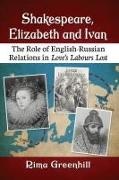Description
Product details
| Authors | Rima Greenhill |
| Publisher | Ingram Publishers Services |
| Languages | English |
| Age Recommendation | from age 18 |
| Product format | Paperback / Softback |
| Released | 05.04.2023 |
| EAN | 9781476684826 |
| ISBN | 978-1-4766-8482-6 |
| No. of pages | 264 |
| Dimensions | 152 mm x 229 mm x 13 mm |
| Weight | 354 g |
| Illustrations | Raster,schwarz-weiss |
| Subjects |
Fiction
> Poetry, drama
Humanities, art, music > Linguistics and literary studies > English linguistics / literary studies Social sciences, law, business > Political science > Comparative and international political science Russia, European History, English, LITERARY CRITICISM / Shakespeare, DRAMA / Shakespeare, International Relations, British & Irish history, United Kingdom, Great Britain, Shakespeare Studies & Criticism, Literary studies: plays and playwrights, Relating to Shakespeare / Shakespearean |
Customer reviews
No reviews have been written for this item yet. Write the first review and be helpful to other users when they decide on a purchase.
Write a review
Thumbs up or thumbs down? Write your own review.

